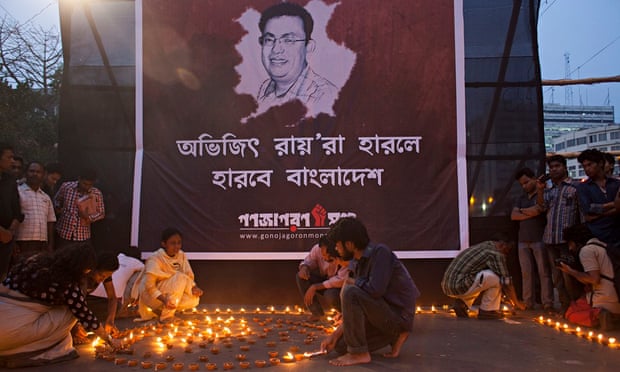Those who challenge religion challenge power. Exercising free speech puts some people in grave danger, and the least we can do is back them up

“No trips to the old country, yeah?” This was the brief message I got from a dear friend who sent me an email with a link to the news that Avijit Roy, a Bangladeshi blogger well-known for his secular views, had been hacked to death in the streets of Dhaka.
“The old country”. How romantic that sounds. I was born in Bangladesh and have wonderful memories of being a child there, roaming the countryside, experiencing a sense of freedom and peace I’ve never felt since. It is a land of lush green fields nourished by a brightly burning sun. This is what is depicted on the nation’s flag, a design that rejects the religious symbolism found in those of India and Pakistan – the latter of which Bangladesh fought a bitter war of independence, partly so it could become a secular state. But that early commitment to secularism has been betrayed and instead Bangladesh has become a nation where those promoting secular values can expect to live their lives in fear, be threatened with death, and even brutally killed.
Avijit Roy was an American citizen of Bangladeshi origin who was an engineer by profession and the author of several books on topics including science, atheism and free expression. He founded the Mukto-Mona (“free mind”) blog which supported and nurtured a community of free-thinkers, secularists, atheists and humanists in Bangladesh. Avijit wanted “to build a society which will not be bound by the dictates of arbitrary authority, comfortable superstition, stifling tradition, or suffocating orthodoxy but would rather be based on reason, compassion, humanity, equality and science.”
He was a hero to many Bangladeshis, but few if any in the west will be declaring that they are Avijit in the way so many of us announced we were Charlie after theCharlie Hebdo attacks. But there are lots of Avijits outside the west, genuinely brave individuals who put their lives on the line to uphold values and freedoms that we take for granted: Ahmed Rajib Haider, another Bangladeshi atheist who was killed because of what he wrote; Raif Badawi, a Saudi Arabian blogger who has been flogged in public and is in prison for “insulting Islam”; Karim Ashraf Mohamed al-Banna, jailed for three years in Egypt, again for “insulting Islam” by simply declaring he is an atheist; Kacem El Ghazzali, who lives in exile after death threats in his home country of Morocco – the list is long and depressing.
The attacks in Paris and Copenhagen shocked the west, but killing people for expressing their views is almost routine elsewhere. According to a report by the International Humanist and Ethical Union, “Non-religious people are being targeted by ‘hate campaigns’ in countries around the world.”
After the Charlie Hebdo killings there was much debate about whether the cartoonists had provoked the killers, about the cartoonists “punching down”, about whether there should be limits to giving offence and so on. The brutal, cowardly murder of Avijit Roy shows how dangerous such arguments can be. Challenging religion is challenging those in power, and many pay a heavy price – we betray people like Avijit when we are half-hearted in our commitment to free speech.
Let’s not be mistaken about why Avijit was killed: he said and wrote things some people didn’t like. There will be more such killings. More people will die because they say, write or draw things that other people don’t like. More people will die until we are all united in stating unequivocally that anyone who commits such atrocities is entirely in the wrong, that it is unjustifiable to kill people who “offend” you, that blasphemy is a ridiculous notion and that no one should ever, ever be killed for “insulting” a religion or drawing a cartoon.
I didn’t know Avijit Roy, but I know people who did, and their grief and rage at his murder is far more keenly felt than mine. For that reason I had reservations about writing this piece, but Avijit’s daughter said that: “To say that I’m furious or heartbroken would be an understatement. But as fucked up as the world is, there’s never a reason to stop fighting to make it better … What would help me the most right now is if everyone (even people I’ve never met) could share his story.” So that’s what I’m doing here.
No comments:
Post a Comment